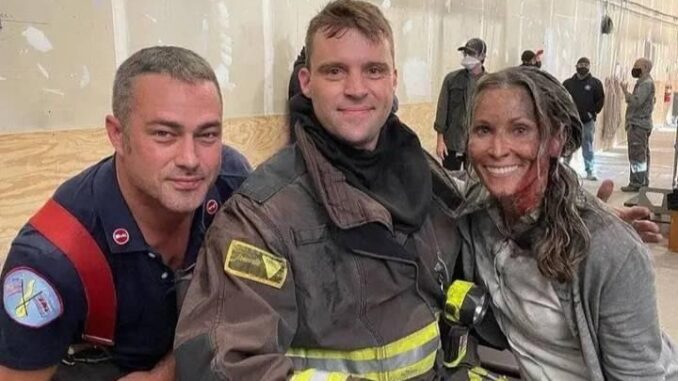
Mouch Takes the Lead: Christian Stolte’s Lieutenant Role Ushers in Firehouse 51 Shake-Up
The clang of the alarm, the screech of tires, the ever-present threat of the unknown – these are the constants in the life of Firehouse 51. But within that volatile landscape, change is inevitable, a force as relentless and transformative as the fires they fight. One such shift, the temporary elevation of Christian Stolte’s Mouch to the role of Lieutenant, reverberated through the firehouse, prompting a fascinating shake-up that revealed the underlying dynamics of leadership, experience, and the surprisingly complex character beneath the walrus mustache.
For years, Mouch has been the heart of 51, the lovable, often clumsy, yet undeniably dedicated veteran. He’s the one cracking jokes to defuse tension, organizing the annual chili cook-off, and providing a listening ear to his younger colleagues. He embodies the comforting stability of routine and the camaraderie that binds the firehouse together. So, when circumstance thrusts him into a leadership position, the initial reaction is a mixture of amusement and apprehension. Can this self-proclaimed “desk jockey” and accidental internet sensation truly guide a team through the chaos of a blaze?
The immediate impact of Mouch’s promotion is a shift in the firehouse’s dynamic. The rigid structure and clear hierarchy, typically upheld by Boden or Casey, loosen. Suddenly, the younger firefighters, particularly Ritter and Gallo, find themselves testing the boundaries. The pranks become more elaborate, the challenges to authority more brazen. While seasoned veterans like Severide and Cruz understand the delicate balance between respect and good-natured ribbing, the younger generation sees Mouch’s leadership as an opportunity to push the envelope. This creates a palpable tension, forcing Mouch to navigate the precarious line between being a friend and being a leader.
The shake-up extends beyond the firehouse pranks and into the field. Mouch, a firefighter known more for his encyclopedic knowledge of fire codes than his physical prowess, is suddenly responsible for strategizing and making life-or-death decisions. He leans heavily on his experience, drawing upon decades spent observing and learning from the best. He delegates tasks wisely, recognizing his own limitations and trusting the expertise of his team. In one particularly harrowing call, Mouch’s quick thinking, born from years of observation, saves a trapped civilian, showcasing his unexpected aptitude for leadership in a crisis.
However, Mouch’s leadership isn’t without its challenges. His insecurities and lack of confidence often surface, leading to moments of self-doubt and hesitation. He struggles with the weight of responsibility, the constant awareness that his decisions directly impact the lives of his fellow firefighters. He wrestles with the desire to be liked and the necessity of making difficult choices, a conflict that highlights the inherent burden of leadership.
The shake-up caused by Mouch’s Lieutenant role ultimately underscores the importance of different leadership styles. While figures like Boden and Casey inspire through their unwavering courage and decisive action, Mouch leads with empathy and understanding. He fosters a sense of community and encourages collaboration, recognizing the strength in the collective knowledge and experience of his team. He reminds them that leadership isn’t solely about issuing commands, but about empowering others and fostering a supportive environment.
Ultimately, Mouch’s temporary reign as Lieutenant serves as a valuable learning experience for everyone at Firehouse 51. He learns to trust his instincts and embrace his strengths, proving that leadership can come in unexpected forms. The younger firefighters learn to appreciate the value of experience and the importance of respecting authority, even when it comes from someone they see as a friend. And the seasoned veterans are reminded that even the most familiar faces can surprise you, revealing hidden depths of strength and resilience.
The firehouse is once again settled back into its familiar rhythm, but the echoes of Mouch’s leadership linger. The shake-up revealed the complex dynamics within 51, reminding them that change, even in the face of constant danger, can be a catalyst for growth and a testament to the enduring strength of the firehouse family. The experience leaves Mouch a changed man, more confident and more aware of his own potential. And Firehouse 51, having weathered the storm, emerges stronger, more united, and with a deeper appreciation for the value of every member, even the one with the magnificent mustache.
